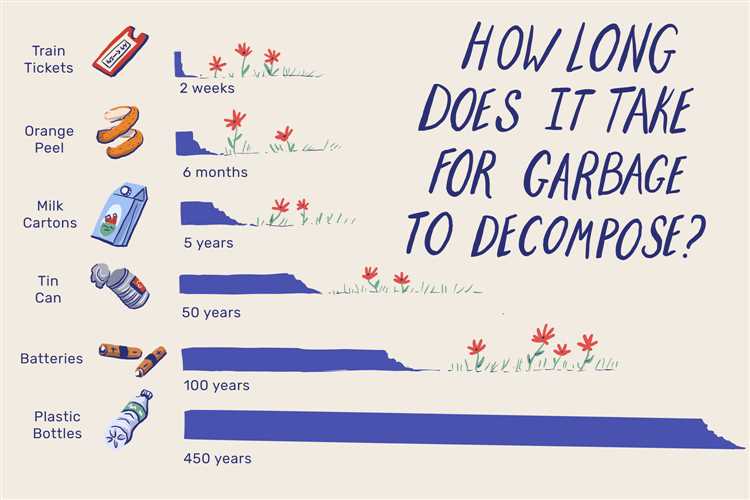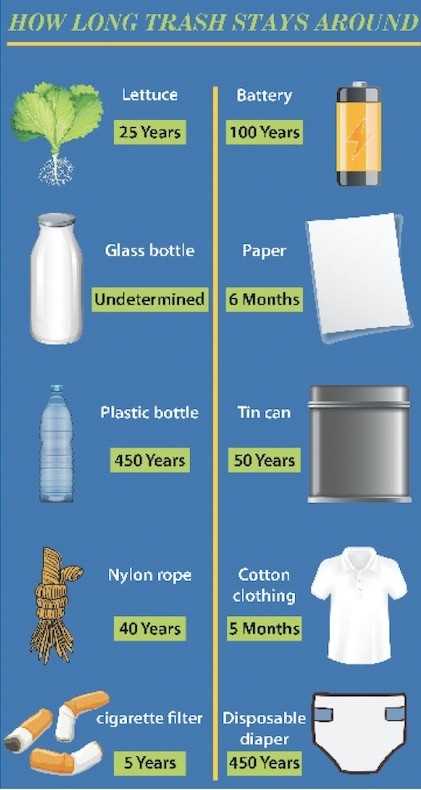
When we think of waste and pollution, plastic often comes to mind as the main culprit. However, it’s important not to overlook the environmental impact of other materials, such as glass. Glass bottles are a common everyday item, used for everything from storing beverages to preserving food. But have you ever wondered how long it takes for a glass bottle to decompose?
The answer may surprise you. Unlike plastic, which can take hundreds of years to decompose, glass is actually a very eco-friendly material. This is because glass is made from natural, sustainable resources like sand, soda ash, and limestone. It’s also 100% recyclable, which means that it can be melted down and reused again and again without losing its quality.
However, this doesn’t mean that glass bottles decompose quickly. In fact, it can take much longer for a glass bottle to break down compared to other materials. Estimates suggest that it can take anywhere from 1 million to a million years for a glass bottle to fully decompose in a landfill. This is due to the fact that glass does not biodegrade like organic materials. Instead, it breaks down into smaller and smaller pieces over time, but it will never completely disappear.
So what does this mean for our environment? Well, it means that every glass bottle we throw away will remain in landfills for hundreds or even thousands of years. This puts a strain on our limited landfill space and contributes to the overall pollution of our planet. That’s why it’s crucial to recycle glass bottles whenever possible. By doing so, we can reduce the demand for new glass production and contribute to a more sustainable future.
- Definition and Characteristics of Glass Bottles
- Characteristics of Glass Bottles
- Uses of Glass Bottles
- Eco-Friendly Alternatives to Glass Bottles
- Stainless Steel Bottles
- Bamboo Bottles
- Aluminum Bottles
- Factors Affecting Glass Bottle Decomposition
- Environmental Impact of Glass Bottle Decomposition
- Landfill Impact
- Environmental Pollution
- Q&A:
- How long does it take for a glass bottle to decompose?
- What factors affect the decomposition of a glass bottle?
- Can glass bottles be recycled?
- Are glass bottles biodegradable?
- What are the benefits of recycling glass bottles?
- How long does it take for a glass bottle to decompose?
Definition and Characteristics of Glass Bottles
Glass bottles are containers made from glass that are commonly used for storing liquids or other substances. They are often used for packaging various types of beverages, such as water, juice, soda, and alcoholic drinks. Glass bottles have been used for centuries and are known for their durability and versatility.
Characteristics of Glass Bottles
Glass bottles are known for their unique characteristics:
- Transparency: Glass bottles are transparent, allowing the contents to be easily visible.
- Durability: Glass bottles are resistant to chemicals and can withstand high temperatures.
- Recyclability: Glass bottles are recyclable and can be made into new bottles or other glass products.
- Non-porous: Glass bottles are non-porous, meaning they do not absorb or leach any substances into the contents.
- Chemical stability: Glass bottles do not react with the contents, ensuring the integrity and quality of the stored substances.
Uses of Glass Bottles
Glass bottles have a wide range of uses:
- Beverage packaging: Glass bottles are commonly used for packaging various beverages, providing a safe and attractive container.
- Food storage: Glass bottles can be used for storing food items such as sauces, oils, and condiments.
- Cosmetics and personal care products: Glass bottles are often used for packaging perfumes, lotions, and other personal care products.
- Decorative purposes: Glass bottles can be used as decorative items, such as flower vases or candle holders.
- Medical and scientific applications: Glass bottles are used in laboratories and medical facilities for storing and transporting various substances.
Overall, glass bottles are popular due to their many advantages, including their durability, recyclability, and chemical stability. They play a significant role in various industries and are a sustainable choice for packaging and storing liquids and other substances.
Eco-Friendly Alternatives to Glass Bottles
While glass bottles have many benefits, such as being reusable and recyclable, there are also eco-friendly alternatives available that can help reduce waste and minimize environmental impact.
Stainless Steel Bottles

Stainless steel bottles are durable and long-lasting, making them an excellent alternative to glass bottles. They are lightweight, making them easy to carry around, and they don’t break if accidentally dropped. Stainless steel is also non-toxic, so you don’t have to worry about any harmful chemicals leaching into your drink. Additionally, stainless steel bottles are easy to clean and maintain, making them a convenient choice for those who are always on the go.
Bamboo Bottles
Bamboo bottles are another eco-friendly option for replacing glass bottles. Bamboo is a renewable resource that grows quickly and requires minimal water and pesticides to thrive. Bamboo bottles are lightweight, making them easy to carry, and they have natural insulating properties, which can keep your beverage hot or cold for longer periods. Additionally, bamboo has antimicrobial properties, which can help keep your drink free from bacteria.
When choosing a bamboo bottle, make sure to look for ones that are made from sustainable bamboo sources and use non-toxic, food-grade coatings.
Aluminum Bottles

Aluminum bottles are another eco-friendly alternative to glass bottles. They are lightweight, shatterproof, and resistant to corrosion. Aluminum can also be recycled indefinitely without losing its quality, making it an excellent choice for reducing waste. These bottles usually come with a non-toxic lining to prevent any interaction between the metal and the drink. However, it’s essential to note that aluminum production and extraction can have environmental impacts, so it’s essential to choose bottles made from recycled aluminum or those produced through sustainable practices.
To make your aluminum bottle even more environmentally friendly, consider adding a reusable silicone sleeve to protect it and give it a personal touch.
Factors Affecting Glass Bottle Decomposition
Decomposition of glass bottles is influenced by various factors, including:
- Composition of the Glass: The type of glass used in the production of the bottle can affect its decomposition rate. Different types of glass have varying levels of acidity and alkalinity, which can impact the rate at which the glass breaks down.
- Environmental Conditions: The conditions in which the glass bottle is exposed to can also impact its decomposition. Factors such as temperature, moisture, and exposure to sunlight or UV rays can accelerate or slow down the breakdown process.
- Location of Disposal: The location where the glass bottle is disposed of can greatly influence its decomposition timeline. Bottles that are buried in landfills may take much longer to decompose due to limited exposure to air and sunlight. On the other hand, bottles left on beaches or in natural environments may decompose more quickly due to the frequent exposure to environmental factors.
- Recycling: Glass bottles that are recycled instead of being discarded in landfills can have a significantly reduced decomposition time. Recycling allows the glass to be reused and repurposed, reducing the need for new glass production and ultimately contributing to a more sustainable waste management system.
Overall, the decomposition of glass bottles is a complex process influenced by multiple factors. By understanding these factors and making conscious choices, we can work towards reducing the environmental impact of glass bottle waste.
Environmental Impact of Glass Bottle Decomposition
Glass bottles have a significant environmental impact due to their decomposition process. While glass is a natural material made from sand, soda ash, and limestone, it does not decompose in the same way organic materials do.
One of the major environmental concerns with glass bottle decomposition is the time it takes for a glass bottle to break down. On average, it can take up to one million years for a glass bottle to decompose fully. This extended decomposition time contributes to the accumulation of glass waste in landfills and natural environments, leading to potential environmental pollution.
Landfill Impact
Glass bottles thrown into landfills occupy significant space, reducing the overall capacity of these waste disposal sites. Moreover, glass does not biodegrade, meaning it will not break down naturally over time. As a result, glass bottles can remain intact in landfills for thousands of years, taking up valuable space and contributing to the demand for new landfill sites.
When glass bottles are not properly recycled or end up in landfills, they can also pose a danger to wildlife. Fragments of broken glass can cause injuries to animals, which may ingest glass shards or become entangled in broken glass objects.
Environmental Pollution
In addition to taking up space in landfills, glass bottles contribute to environmental pollution in several ways. When glass breaks down into smaller fragments, it can release sharp edges that pose a risk to humans, animals, and the environment.
When glass is not recycled and ends up in natural environments, it can also contribute to the pollution of bodies of water. Glass fragments can be carried by wind or water and eventually find their way into rivers, lakes, and oceans. This pollution can harm aquatic life, contaminate water sources, and affect the ecosystem as a whole.
It is crucial to recycle glass bottles to minimize their impact on the environment. Recycling glass helps save energy and reduces the need for raw materials, ultimately reducing greenhouse gas emissions. By properly disposing of glass bottles, we can mitigate the environmental impact associated with their decomposition.
Q&A:
How long does it take for a glass bottle to decompose?
A glass bottle can take anywhere from 1 million to 1 million years to decompose.
What factors affect the decomposition of a glass bottle?
The decomposition rate of a glass bottle can be affected by factors such as environmental conditions, pH levels, and the presence of microorganisms.
Can glass bottles be recycled?
Yes, glass bottles can be recycled and reused. Recycling glass helps reduce the need for raw materials and helps conserve energy.
Are glass bottles biodegradable?
No, glass bottles are not biodegradable. Unlike organic materials, glass does not break down into natural elements and stays in the environment for a long time.
What are the benefits of recycling glass bottles?
Recycling glass bottles helps reduce waste, conserve resources, save energy, and reduce pollution. It also helps create new jobs in the recycling industry.
How long does it take for a glass bottle to decompose?
A glass bottle can take more than a million years to decompose.